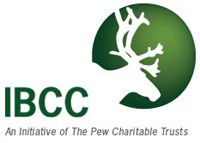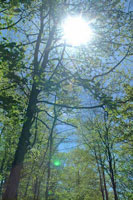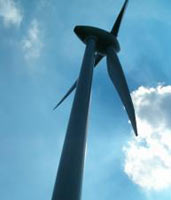
News |
- Ontario Boreal Needs Planning and Protection
- Time to Reduce Plastic Bag Use
- Anti Kyoto Speed Limit Increase Proposed
- Maps Show Boreal As Carbon Storehouse
- EPA Sued Over Greenhouse Gas Rules
- Canada's Boreal Forest - Carbon Source And Sink?
- Ainsworth OSB Mill Unlikely in Manitoba
- France Sets Renewable Energy Targets
- Floodway Recreation Park Designated
- Canada's Boreal Leaders Celebrated
- Canada Bows to Pressure at Bali's 11th Hour
- Bali: International Disapproval of Canada
| Ontario Boreal Needs Planning and Protection | 17 January 08 |
 The Environmental Commissioner of Ontario (ECO) identified inadequate land use planning as a top concern in its December 4, 2007 report, Reconciling Our Priorities. The Environmental Commissioner of Ontario (ECO) identified inadequate land use planning as a top concern in its December 4, 2007 report, Reconciling Our Priorities.Development pressures in Ontario's north threaten to destroy the Boreal Forest. The Boreal is a vast carbon sink, home to herds of woodland caribou, and located across northern First Nation's traditional territories. The report indicates "Ministries appear to have blinders on with respect to big picture planning, concerning themselves only with their own mandates in energy supply, mining and forestry." Comprehensive lands planning system is key to addressing environmental priorities and protection of the Boreal Forest. ECO's report notes Ontario's current planning mechanisms are defective and legislation impedes land use planning. "Manitoba does not have an Environmental Commissioner despite promises from the NDP," says Gaile Whelan Enns, Director, Manitoba Wildlands. We have a lot of rhetoric in support of lands planning, but most attention continues to go to development planning. The East Side Planning Initiative has not produced a single lands plan in the last five years." View Environmental Commissioner of Ontario 2006/2007 Annual report (PDF) Source: Environmental Commissioner of Ontario |
|
| Time to Reduce Plastic Bag Use | 17 January 08 |
 Resource Conservation Manitoba (RCM) announced a plan recently to reduce the 200 million disposable plastic bags provided to Manitobans each year at grocery stores and retail shops. Resource Conservation Manitoba (RCM) announced a plan recently to reduce the 200 million disposable plastic bags provided to Manitobans each year at grocery stores and retail shops.Plastic bags contribute to litter and waste, and take an estimated 1000 years to break down in a landfill. RCM aims to educate the public and to support making reusable alternatives available. RCM's target of reducing disposable plastic bags by 90 percent in 3 years reflects action elsewhere. San Francisco, a population comparable to Manitoba, was the first city in North America to ban the use of plastic bags. Extended Producer Responsibility programs are being developed in Manitoba and in Canada, RCM hopes plastic bags will be included in the program definitions. For each 100 million plastic bags eliminated 1.5 million liters of oil and 4.2 million kilograms of carbon dioxide are saved. "Plastic bags are everywhere," says Randall McQuaker, executive director of Resource Conservation Manitoba. "They use up resources and produce unnecessary waste. In some sense, they are a kind of symbol for our throw-away society. It is great that people really seem ready to do something about the problem." Most large chain food and retail stores in Manitoba are now making reusable bags available to consumers. View January 11, 2008 Planet Ark article View January 11, 2008 Planet Ark article (2) View Resource Conservation Manitoba January 2008 News View March 28, 2007 CBC News article Source: PlanetArk, Resource Conservation Manitoba, CBC |
|
| Anti Kyoto Speed Limit Increase Proposed | 17 January 08 |
 Manitoba's proposed increase to speed limits on Highway 1 and 75 is raising environmental, economic, and safety concerns from Manitoba Trucking Association (MTA). Manitoba's proposed increase to speed limits on Highway 1 and 75 is raising environmental, economic, and safety concerns from Manitoba Trucking Association (MTA).The Manitoba Public Insurance (MPI) website states, "As speed increases, pollutants increase. From 90 km/h to 110 km/h, there is a 100 per cent increase in carbon monoxide emissions, 50 per cent increase in hydrocarbons and 31 percent increase in nitrogen oxides." MPI is a publicly owned corporation, managed through Manitoba's government. Fuel is the largest operating cost for a trucking company and is subsequently passed onto the consumer. An increase speed from 100 to 110 km burns 13 percent more fuel. Studies show increased speed results in more severe collisions. A recent government contracted report claimed a 2.5 percent increase in speed could result in a 12 percent increase in fatalities and 7 percent increase in serious personal injuries. "It is clear increased speed uses more fuel, so our government would collects more taxes. This would be a policy to increase emissions, when the Manitoba government has indicated the transportation sector is a priority for its upcoming climate change action plan," Gaile Whelan Enns, director of Manitoba Wildlands indicated. The Manitoba Highway Traffic Board will conduct hearings on the proposed speed limits in Winnipeg on February 12 and in Brandon on February 13, 2008. Newspaper notices will be posted soon. View January 13, 2008 Winnipeg Free Press article View January 10, 2008 Today's Trucking Online article View January 10, 2008 CBC News article Source: Winnipeg Free Press |
|
| Maps Show Boreal As Carbon Storehouse | 15 January 08 |
 Canada's Boreal Forest was called the World's largest terrestrial carbon storehouse at the United Nations conference on climate change in Bali. Canada's Boreal Forest was called the World's largest terrestrial carbon storehouse at the United Nations conference on climate change in Bali.Three maps released at the climate change conference identify Canada's Boreal Forest as having the world's largest peatlands. Peatlands are a key to carbon storage, and, combined with great areas of permafrost contain nearly 90 percent of carbon found in all Canadian soils. "Clearly, Canada's Boreal region is a life-support system for the planet because of its key role in carbon storage," said Susan Casey-Lefkowitz, Director of the Natural Resources Defense Council's Canada Program. View the Release: Boreal Forest is World's Carbon Vault - Breakthrough Mapping Analysis Looks at Peatlands, Permafrost and Soil Carbon in Canadian Boreal (DOC) View Boreal Forest is World's Carbon Vault - Maps (PDF) Visit the International Boreal Conservation Campaign Source: International Boreal Conservation Campaign |
|
| EPA Sued Over Greenhouse Gas Rules | 07 January 08 |
 California sued the US government January 2, 2008 in its ongoing bid to set the country's first greenhouse gas limits on cars, trucks and SUVs, providing new data to show its program is superior to a federal plan. California sued the US government January 2, 2008 in its ongoing bid to set the country's first greenhouse gas limits on cars, trucks and SUVs, providing new data to show its program is superior to a federal plan.The lawsuit asks the US Environmental Protection Agency to review its decision last month to deny California a waiver it and 16 other states need to regulate greenhouse gases from new cars and trucks. EPA Administrator Johnson said energy legislation signed by President Bush will raise fuel economy standards to an average of 35 miles per gallon by 2020, which he called a far more effective approach to reducing greenhouse gases than a patchwork of state regulations. But an analysis released January 2, 2008 by California air regulators showed their 2004 tailpipe regulation would be faster and tougher than the federal fuel economy rules. "He's wrong factually and legally," said David Doniger, an attorney for the Natural Resources Defense Council, which led environmental groups in filing a similar lawsuit January 2, 2008. "No other state can claim to be affected in so many serious ways as California." Twelve other states - Connecticut, Maine, Maryland, Massachusetts, New Jersey, New Mexico, New York, Oregon, Pennsylvania, Rhode Island, Vermont and Washington - have adopted California's emissions standards, and others have said they plan to do so. The 12 states, along with Arizona, Delaware and Illinois, intend to intervene in support of California. View January 2, 2008 Associated Press article View January 2, 2008 CBC article View January 2, 2008 Natural Resources Defense Council article Source: AP |
|
| Canada's Boreal Forest - Carbon Source And Sink? | 07 January 08 |
 Forests dynamics are not responding as predicted to climate change as warmer and longer autumn seasons reduce their ability to absorb carbon. Forests dynamics are not responding as predicted to climate change as warmer and longer autumn seasons reduce their ability to absorb carbon.New research has shown the amount of carbon absorbed by trees is less than that emitted by soil microbes whose increased activity is a result of warmer temperatures and longer seasons. Microbes breakdown organic materials and release carbon dioxide. "By the time autumn comes around, soils have warmed up and the microbes are active, as we move into autumn, the forests tend to emit carbon because the days get shorter" said Margolis, an ecosystem scientist at the University of Laval. "Canada's boreal forests are the largest carbon sinks in the world. For Canada's boreal regions to continue in this global climate services role we need to think beyond soils and trees, and asses the carbon in the waterways, peatlands, and muskeg. Each significant protected area established in our boreal forest regions also protects carbon, and provides climate services," said Gaile Whelan Enns, director of Manitoba Wildlands. View January 3, 2008 Canadian Press article View January 3, 2008 CanWest News Service article View January 3, 2008 Mongabay.com article View January 3, 2008 Cordis News article View January 4, 2008 Globe and Mail article View January 6, 2008 CanWest News Service article Sources: Canadian Press, CanWest News, Cordis, Mongabay.com |
|
| Ainsworth OSB Mill Unlikely in Manitoba | 07 January 08 |
|
In May 2006, Ainsworth signed a commitment agreement with the Manitoba Government for construction and operation of a $250 million OSB facility northeast of Winnipeg. The company was to provide a $2.5 million performance security and would be offered a Forest Management Licence for 838,000 cubic meters of hardwood fibre per year. Ainsworth agreed to provide First Nations with opportunities for participation in the project. No other details have been made public in Manitoba since the May 2006 announcement. At the end of 2007 Ainsworth announced an indefinite closure of an OSB mill at High Level, Alberta due to operating losses and reduced customer demand. They curtailed mill operations at 100 Mile House, BC; Cook, Minnesota; Bemidji, Minnesota; Grand Prairie, Alberta; and Barwick, Ontario due to high production costs and declined orders. Ainsworth saw market prices drop 30% in the US in their third quarter of 2007. Forest analysts say 2008 will be a tough year for Ainsworth Lumber Co. Ltd, the fourth largest producer of OSB and give no hope for an upturn. View December 17, 2007 Winnipeg Free Press article (DOC) View November 27, 2007 Ainsworth press release (PDF) View November 5, 2007 Ainsworth press release (PDF) Sources: Winnipeg Free Press, Ainsworth |
|
| France Sets Renewable Energy Targets | 07 January 08 |
 Wind and solar power are at the heart of a big new push by the French government to increase the renewable share of the country's total energy consumption from 6.7 percent in 2004 to 20 percent by 2020. Wind and solar power are at the heart of a big new push by the French government to increase the renewable share of the country's total energy consumption from 6.7 percent in 2004 to 20 percent by 2020.The government has set a target of raising its installed capacity for wind power from 810 megawatts (MW) in 2006 to 25,000 MW by 2020. In addition, 5 million solar thermal units are to be installed in buildings by 2020, 80 percent of these in homes. "These targets mark a new era in the development of wind and solar power in France, and though they are ambitious, they can be achieved," Jean-Michel Parroufe head of the renewable energy division at the French Environment and Energy Management Agency. View January 2, 2008 Renewable Energy Access article Source: Renewable Energy Access |
|
| Floodway Recreation Park Designated | 03 January 08 |
 A new Duff Roblin Park Reserve was announced by Manitoba Conservation during December 2007. Recreational development and economic opportunities are dominant themes for the park with protected lands being absent from the Provincial Parks Act regulation, December 11, 2007. A new Duff Roblin Park Reserve was announced by Manitoba Conservation during December 2007. Recreational development and economic opportunities are dominant themes for the park with protected lands being absent from the Provincial Parks Act regulation, December 11, 2007.This 56 hectare park reserve has been situated in a new St. Norbert location to include the Winnipeg Floodway Inlet Control Structure and a section of the newly expanded floodway. The area will see construction of trails and facilities including washrooms and picnic shelters with 24 ha under an Access land use category. The remaining area is classified as Heritage to recognize the historical and socio-economic importance of the floodway, and its floodgates. "Manitoba Wildlands supported recreational developments for the expanded floodway during the public licensing review. Built heritage structures and non-original habitat, of course, do not provide protection for biodiversity," said Gaile Whelan Enns of Manitoba Wildlands. View December 7, 2007 Manitoba Government Release View Manitoba Government Duff Roblin Park Reserve Backgrounder (DOC) View December 11, 2007 Provincial Parks Act Regulation (PDF) Visit Manitoba Conservation - The New Duff Roblin Park Reserve Source: Manitoba Government |
|
| Canada's Boreal Leaders Celebrated | 19 December 07 |
 Poplar River First Nation has been honoured once again! On December 6, 2007 the Canadian Boreal Initiative hosted a National Gala in Ottawa to acknowledge their Boreal Awards Winners. Poplar River First Nation has been honoured once again! On December 6, 2007 the Canadian Boreal Initiative hosted a National Gala in Ottawa to acknowledge their Boreal Awards Winners. The Boreal Awards recognize leadership, innovation, cooperation and excellence among stakeholders who live and work in Canada's Boreal Forest region. The awards also acknowledge those who have made an outstanding contribution to protection of the Boreal Forest and advancement of principles outlined in the Boreal Forest Conservation Framework. Poplar River First Nation has been untiring in their efforts to protect their traditional lands and waters. This award is just another step toward Poplar River First Nation's goal of permanent protection for their traditional lands, with listing of a World Heritage Site by UNESCO. "The hard work of many, many people, including communities we honoured last night, has created the opportunity to celebrate some of the most significant land conservation initiatives in North American history, protecting millions of hectares of the Canadian Boreal Forest," said Larry Innes, Executive Director of the Canadian Boreal Initiative (CBI). The Canadian Boreal Forest is the largest intact forest remaining in the world; is of great ecological importanc; a giant carbon source and home to an abundance of wildlife; songbirds, and waterfowl. CBI has supported Poplar River First Nation in their ongoing boreal protection efforts, while supporting the communities involved in the boreal World Heritage Site in Manitoba and Ontario. View December 7, 2007 Canadian Boreal Initiative press release on CNW Visit Poplar River First Nation website View Canadian Boreal Initiative Conservation framework Source: Canadian Boreal Initiative |
|
| Canada Bows to Pressure at Bali's 11th Hour | 19 December 07 |
 Nations attending the Bali Kyoto negotiations agreed December 15, 2007 on a "Bali roadmap" to launch negotiations for a post-2012 global climate agreement. The roadmap will be guided by scientific analysis of the emission cuts needed to avoid dangerous climate change. Nations attending the Bali Kyoto negotiations agreed December 15, 2007 on a "Bali roadmap" to launch negotiations for a post-2012 global climate agreement. The roadmap will be guided by scientific analysis of the emission cuts needed to avoid dangerous climate change.Key developing countries signaled a willingness to take on new commitments at the two-week-long UN climate conference. However, Canada worked with the United States for most of the meeting to oppose crucial elements of the Bali roadmap. As a result, parts of the deal are too vague to assure a successful outcome of the next round of UN climate negotiations, due to be completed in 2009. "The world moved forward in Bali, but we had the opportunity to do much more," said Steven Guilbeault of Équiterre in Montreal. "The good news is that the Bali deal recognizes that rich nations need to cut their greenhouse gas pollution by 25 to 40 per cent below 1990 levels by 2020, and nations will negotiate the next phase of Kyoto on that basis." Canada initially opposed this emissions reduction range in the final negotiating session, but agreed not to block the consensus position when it found itself virtually isolated. "Canada worked against the key elements of this deal for most of the two weeks in Bali, and was singled out by other countries and high-ranking UN officials for its obstructive behaviour," said Dale Marshall, David Suzuki Foundation. "In the end, the government responded to public pressure and allowed this deal to go through." View December 15, 2007 Climate Action Network Canada release View December 18, 2007 World Evangelical Alliance article on TheGreenPages.ca Visit Manitoba Wildlands' Bali Conference information Visit AVAAZ.org International Campaign for Bali Road Map Source: Climate Action Network Canada |
|
| Bali: International Disapproval of Canada | 13 December 07 |
 Canada is fast becoming one of the 'villains' at the United Nations Climate Change meetings in Bali, Indonesia. Canada is taking turns with the US and Japan blocking progress and watering down draft texts for the high-level segment of the conference starting December 12th. Canada is fast becoming one of the 'villains' at the United Nations Climate Change meetings in Bali, Indonesia. Canada is taking turns with the US and Japan blocking progress and watering down draft texts for the high-level segment of the conference starting December 12th.Criticism is coming from environmentalists, respected scientists, fellow negotiators and the head of the UN itself. Yvo de Boer, UN climate chief, portrayed Canada as a climate hypocrite, demanding cuts in emissions by Third World countries after failing to meet its own commitments. "I personally find it interesting to hear Canada indicating it would not meet its commitments under the Kyoto protocol and calling on developing countries to take binding reduction targets," he told a press conference. Rajendra Pachauri, head of the Nobel Peace Prize winning Intergovernmental Panel on Climate Change blasted the Harper government for its climate stance. "This particular government has been a government of skeptics," said Mr. Pachauri. Su Wei, a senior Chinese delegate at the Bali negotiations, said Canada and Japan are emerging as the most uncooperative nations at the climate talks. View December 9, 2007 Canadian Press article in the Toronto Star View December 10, 2007 Globe and Mail article View Manitoba Wildlands' Bali Climate Conference Staff Updates Visit Bali Climate Conference website Visit Climate Action Network International website Sources: Canadian Press, Globe and Mail |
|


 RSS Feeds:
RSS Feeds: